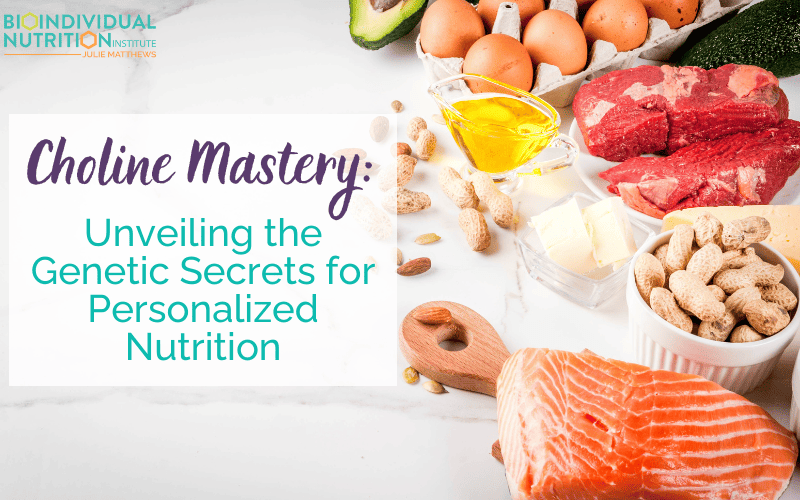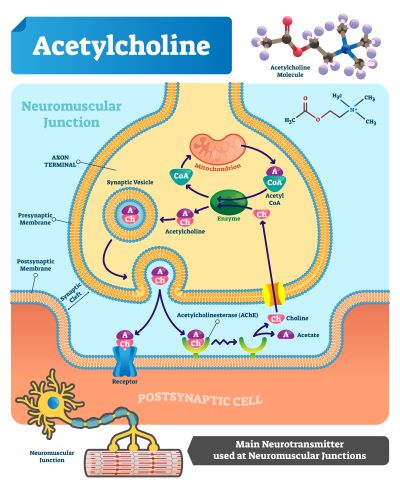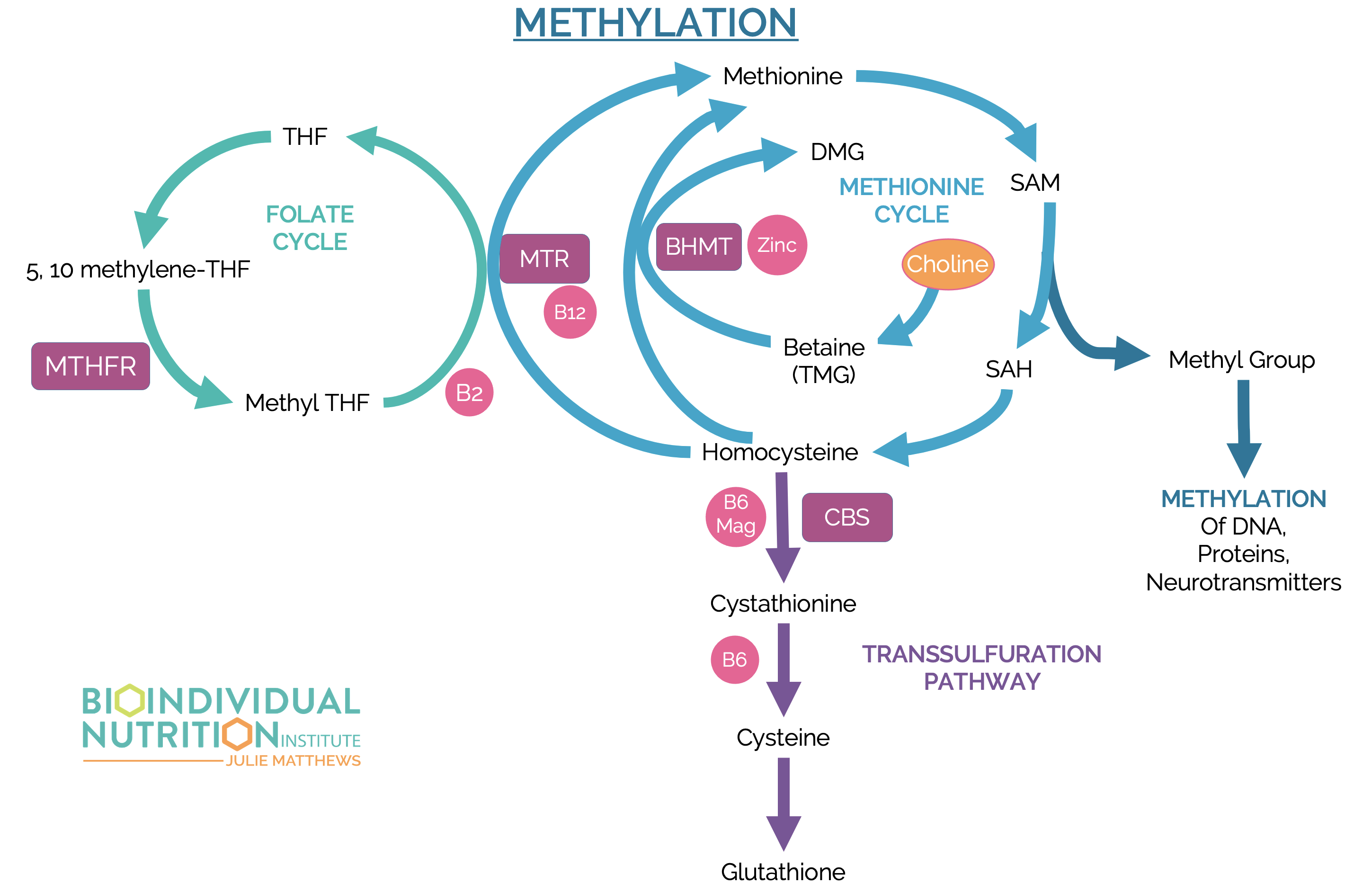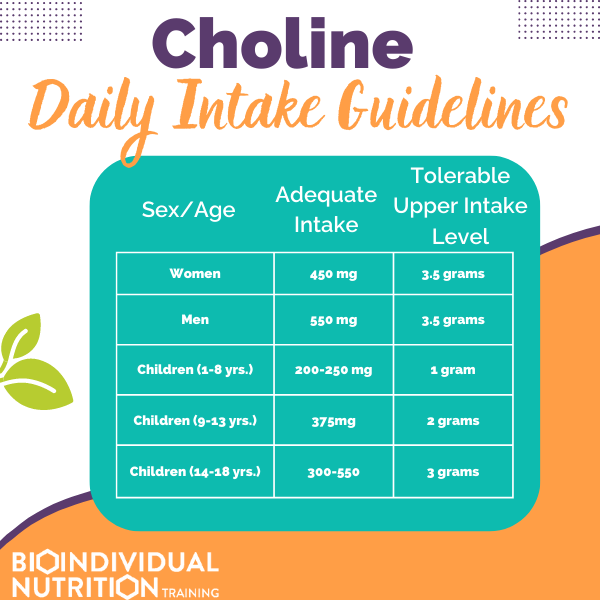
Personalized Nutrition Choices that Improve Health
As with many nutrients, choline intake is bioindividual. Because of the important uses of choline including gene expression, knowing that some clients may need more choline than others (and which clients) is very important.
One reason choline deficiency is a problem is because of the negative health messages around eggs. Eggs are a great source of choline. Unfortunately, many people have been limiting their intake of eggs for concern with cholesterol in eggs. This is a topic for another day. Just suffice it to say, new research on eggs shows that up to 3 eggs a day is associated with higher good HDL cholesterol, lower atherogenic LDL levels, and higher antioxidant status.[1]
However, the issue with choline deficiency goes beyond eggs and dietary sources of choline. Genetic polymorphisms in choline and folate related genes play a large role in choline deficiency and are important factors to understand in those of us who practice personalized nutrition.
The Important Health Effects of Choline
Choline is an important nutrient. It’s involved with the production of acetylcholine, the neurotransmitter that activates our muscles, and phospholipids that repairs the myelin sheath. A deficiency in choline can lead to dysfunctions in the liver and muscles.[2]
And choline is also very important during pregnancy. Pregnant women who consumed low amounts of choline shortly before and after conception had an increased risk of having a baby with neural tube defects.[3]
Choline and DNA Methylation
The other important function of choline is in methylation. Methylation helps us make neurotransmitters, metabolize fatty acids, and create cellular energy. And one of the most essential functions of methylation is regulating gene expression through the epigenetic process of DNA methylation. Good gene expression ensures the right genes are silenced (or activated) for proper function and health. Poor DNA methylation is associated with cancer, heart disease, and many other diseases.
Methylation requires the recycling of homocysteine to methionine for the production of methyl donors used for methylation. Choline is one such methyl donor that is involved in this process.
There are two pathways for the conversion (recycling) of homocysteine to methionine, which is then used to create SAMe, our universal methyl donor for methylation. They are the enzymes methionine synthase through the MTR gene (which requires folate and B12) and betaine-homocysteine S-methyltransferase (BHMT), which uses choline.[4]
Since choline is needed for methylation including gene expression, it’s easy to see how choline deficiency can have far-reaching negative health effects.

PEMT SNP and Choline Deficiency
The need for choline is bioindividual. Some premenopausal women have protection against choline deficiency, but others do not. More than 50% of premenopausal women may be at less risk of deficiency because of estrogen. Estrogen assists in the production of choline through the gene PEMT (phosphatidylethanolamine-N-methyltransferase). Unfortunately, premenopausal women with a SNP in PEMT (rs12325817) are not able to make endogenous choline and are at greater risk of choline deficiency, as well as organ dysfunction when their diet was deficient in choline.[5]
And because choline is so critical for the developing fetus, it’s important to make sure pregnant women and those looking to get pregnant are getting adequate dietary choline. Additionally, postmenopausal women and men also do not have this protection and need to get dietary choline daily.
Folate and the MTHFD1 SNP
And for individuals with a SNP (rs2236225) in MTHFD1, a folate gene, their need for choline is also significant. In a study of premenopausal women with the MTHFD1 SNP, they have 15 times greater risk of organ dysfunction from a low choline diet.[6]
Since 50% or more of the population has a genetic variant that affects choline and/or folate, this is an important concept for nutrition professionals to understand. And because choline and folate metabolism are both very important to methylation, folate deficiency increases the need for choline as a methyl donor.[2]
Choline and Bioindividual Nutrition
Given the nutrigenetic impact of these polymorphisms on increased need for choline and/or folate, targeted supplementation using a bioindividual nutrition approach is recommended by researchers.[7] Understanding the biochemical individuality of your client or patient is important for determining the best diet and nutrient recommendations for them. Considering the whole person including their genetics and diet are beneficial for creating a Bioindividual Nutrition approach that is best.
Dietary Recommendation for Choline
Choline needs can be met through diet for many people.
However, there are different opinions on what the ideal dose of choline is per day. Our institutions such as the Institute for Medicine and other government bodies set guidelines for nutrient levels. For choline, they put out the adequate intake (which is the average amount a healthy population needs to not be at increased risk of disease), the minimum most people need to prevent disease or dysfunction and tolerable upper intake level (the upper amount that the likely not to cause negative effects in the vast majority of people). The “adequate intake” levels for choline appear to not be sufficient for many people.
The following chart summarizes that data. For those really interested you can find more details on additional age groups and conditions that refine these numbers even further. One of my favorite books from my master’s degree studies, Medical Nutrition and Disease,[8] has a great chart on choline and many other nutrients with further detail.

Sources of choline
As I mentioned, it is possible to meet your needs for choline from your diet. Although, it will probably require the individual to eat eggs and animal foods to do so and will depend on how much they personally need.
Here is a list of foods high in choline:
The serving size is 3 ½ ounces/100 grams, unless otherwise specified.
Beef liver, 418 mg
2 Eggs, 281 mg
Cooked shiitake mushrooms, 1 cup, 116 mg
Pork, 102 mg
Cod fish, 83 mg
Beef, 78 mg
Chicken, 78 mg
Cooked immature lima beans, 1 cup, 75 mg
Cooked cauliflower, 1 cup, 72 mg
Red potato, 1 large, 57 mg
Cooked kidney beans, 1 cup, 54 mg
Peanuts, 52 mg
Cooked quinoa, 1 cup, 43 mg
Broccoli, 40 mg
Legumes, 27 mg
Almonds, 1 ounce, 15 mg
Conclusion
Understanding the bioindividual nutrition need for choline is crucial. Choline is vital for many physiological functions. It’s key for neurotransmitter production and most importantly DNA methylation. Its role in influencing gene expression makes it critical to our health and the health of our clients and patients.
Genetic SNPs, including PEMT and MTHFD1, impact our BioIndividual Nutrition need for choline. Our stage of life also plays an important factor. Premenopausal women with specific polymorphisms face the possibility of choline deficiency, which can affect their developing baby when pregnant. And postmenopausal women and older individuals also have greater need for dietary choline. Folate adds another level of complication to the issue. Understanding these nutritional issues can help you serve you clients best and help you be a standout practitioner among your colleagues and clientele.
In the field of personalized nutrition, addressing the biochemical individuality of each person provides the most customized nutritional recommendations and beneficial results. As we aim to address the genetic and nutritional needs of our clients and patients, a Bioindividual Nutrition approach becomes a key methodology for supporting health and healing.
References:
- DiMarco DM, Norris GH, Millar CL, Blesso CN, Fernandez ML. Intake of up to 3 Eggs per Day Is Associated with Changes in HDL Function and Increased Plasma Antioxidants in Healthy, Young Adults. J Nutr. 2017;147(3):323-329. doi:10.3945/jn.116.241877
- Zeisel SH. Nutritional genomics: defining the dietary requirement and effects of choline. J Nutr. 2011;141(3):531-534. doi:10.3945/jn.110.130369
- Shaw GM, Carmichael SL, Yang W, Selvin S, Schaffer DM. Periconceptional dietary intake of choline and betaine and neural tube defects in offspring. Am J Epidemiol. 2004;160:102–9
- Zeisel S. Choline, Other Methyl-Donors and Epigenetics. Nutrients. 2017;9(5):445. Published 2017 Apr 29. doi:10.3390/nu9050445
- da Costa KA, Kozyreva OG, Song J, Galanko JA, Fischer LM, Zeisel SH. Common genetic polymorphisms affect the human requirement for the nutrient choline. FASEB J. 2006;20:1336–44
- Kohlmeier M, da Costa KA, Fischer LM, Zeisel SH. Genetic variation of folate-mediated one-carbon transfer pathway predicts susceptibility to choline deficiency in humans. Proc Natl Acad Sci U S A. 2005;102(44):16025-16030. doi:10.1073/pnas.0504285102
- Ivanov A, Nash-Barboza S, Hinkis S, Caudill MA. Genetic variants in phosphatidylethanolamine N-methyltransferase and methylenetetrahydrofolate dehydrogenase influence biomarkers of choline metabolism when folate intake is restricted. J Am Diet Assoc. 2009;109(2):313-318. doi:10.1016/j.jada.2008.10.046
- Hark L, Deen D, Morrison G, eds. Medical Nutrition and Disease: A Case-Based Approach. Fifth edition. John Wiley & Sons Inc; 2014.


